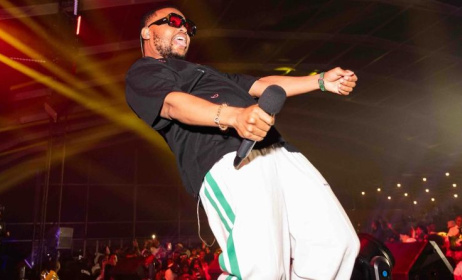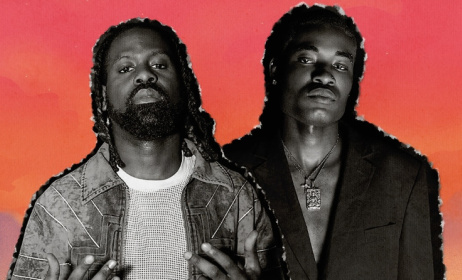Ajebutter22's Lagos confessions
Everything about Ajebutter22 is geared towards projecting an image of comfort. His name (one who eats butter) connotes bourgeoisie upbringing.
 Album art for Ajebutter22's What Happens in Lagos.
Album art for Ajebutter22's What Happens in Lagos.
Always dressed in clean-cut blazers and print dresses, he became popular through comic offerings like ‘Senrenre’ and ‘Omo Pastor’. These attributes suggest his second album What Happens in Lagos will record the hedonistic life associated with the Vegas origins of the title. But it does not.
To expect such documentary-like insight into the life of upper-class Lagosians is a category error. Ajebutter22 is not as interested in describing Lagos as he is in telling you his story: that of a young man who has grown into a Lagos big boy. He is, before all else, a confessional artist.
Sad ruminations on the inner life through rap—confessional hip hop, or emo rap—is often scoffed at by hip hop heads. Theirs is a genre that will rather be about bravado than bonding with an audience over sob stories. (That is before Jay-Z made confessions cool again in 4:44.) Ajebutter22 is an emo rapper. Heartbreak, frustrations and aspirations can be heard in his words. He is introspective, even sombre, in spite of what songs like ‘Ghana Bounce’ will have you think.
When he raps, Ajebutter22 delivers lines with the deliberateness of a spoken word poet. He’s at his best when the beat moves at a relaxed pace. Rapid tempo makes his rap fall behind the beat. He also sings in a voice that mimics the inflections of Fuji singers, complete with a liberal dropping of “Olorun”, the name of God in Yoruba. His insistence on singing with his raspy voice contributes to his enigmatic reputation. He can’t possibly be serious in that voice, goes the thought. But he is.
“I’ve been waiting for today / waiting for the time I’ll say my mind / I’ll rap about what happens in my life / put everything on the line,” he sings on ‘Good Place to Start’, the first song on What Happens in Lagos. He makes his intentions known here, both through the hook by Mystro and his verse. He even confesses to talking to God saying, “I’m only confessing to heaven, Olorun.” On ‘Dollar ti won’, he sings: “I think of girls and I wonder like men what could have happened/ Omolola in Houston, she could have been the one / but men let’s change the subject.”
So, how does Ajebutter22 sing about his feelings without coming off as annoyingly solipsistic? Well, he changes the subject. He layers his laid-back vibe with humour and the occasional social commentary. “I like to drop joke, drop banter” he says on ‘Lifestyle’, a song where he’s talking to a young girl who has a “small boyfriend acting like a big man”. A penchant for humour is why he doesn’t sound like a whiny Drake at his navel-gazing worst.
Ajebutter’s focus on himself doesn’t overwhelm his attempt to capture Lagos. ‘4am’ reflects the life of Lagosians who have to wake up and leave for work early or suffer in traffic. ‘Rich Friends’ captures the experience of living in a city where, no matter how rich you are, there’s always someone who can make you feel poor and, if you don’t resist the temptation, make you spend money you don’t have.
Ajebutter’s lyricism isn’t always stellar. Sometimes he drops befuddling but catchy lines like “If you’re broke as a joke you need a sense of humour” in ‘Dollar ti Won’. Then on the same song, he delivers non-sequiturs just to achieve a set up and punchline. “Economy is down and dollar ti won/ I put a rocket on my back like Olajuwon/ if I get credit alert mo ma lowo juwon/ and all the girls emi ni wo ma sunmo.” He later references Houston—home of the Rockets basketball team—on the same song, but the Olajuwon line seems to exist just to complete 16 bars.
The latter part of the album features three songs that cover status ('We are Bad Boys'), wants ('Anything for the Boys') and myths ('Yoruba Boys Trilogy') about men. The latter is an anthology track made up of three songs featuring Odunsi. And it’s the most experimental song of the album. Odunsi’s sound fits just well on this track as Maleek Berry does excellently on ‘Lifestyle’.
“Any piece of music intending to capture Lagos must overuse the horn section,” the critic Oris Aigbokhaevbolo once wrote. And Ajebutter22 fulfils this with his use of horns in afrobeat-tinged ‘Wayward’, arguably the best track on the album. He doesn’t capture the life of Africa’s most populous city to the extent achieved by fellow rapper Olamide who has perfected the art of capturing the life and emotions of Lagos, but he tries.
Ajebutter22’s slow-paced rap fits the prevailing style of Nigerian pop music, even if his love for languid tempo predates the Juls-inspired trend. He probably won’t be named anyone’s favourite artist, but in a culture now focused on creating good vibes, Ajebutter22 is the right kind of rapper. Even if his Lagos is alien to you and his lyrics offer no appeal, he has created a mood that overrides reservations.
Buy What Happens in Lagos on iTunes
Artist: Ajebutter22
Album: What Happens in Lagos
Label, Year: Jungle Entertainment Ventures, 2017





























Comments
Log in or register to post comments